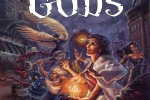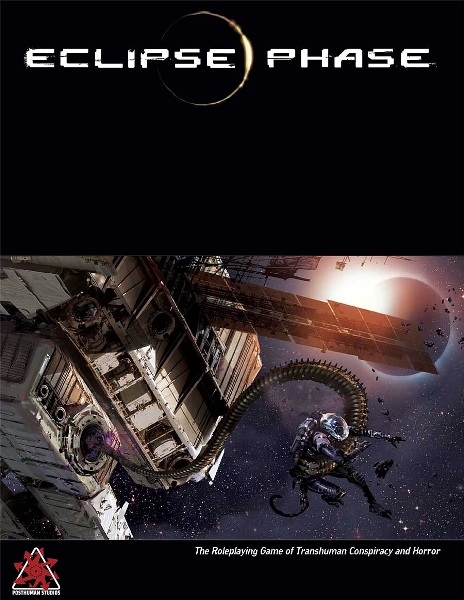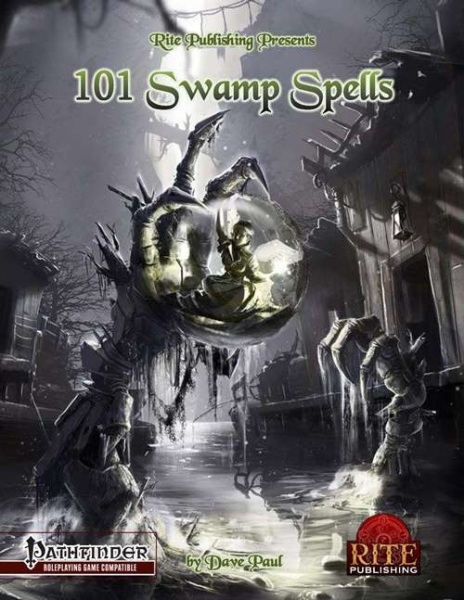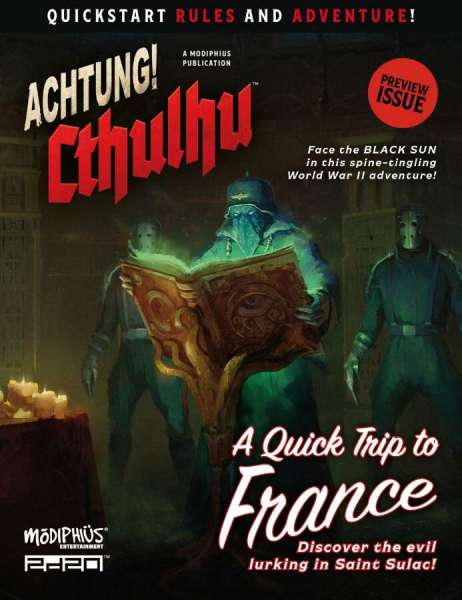Part-Time Gods
Part-Time Gods is a modern divine fantasy system (powered by the Dynamic Gaming System-Lite) published by Third Eye Games and written by Eloy Lasanta.
By Aaron T. Huss
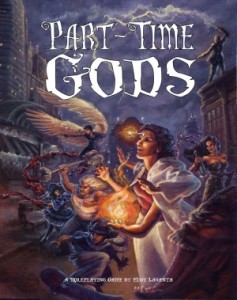
Part-Time Gods is the latest DGS-powered game by Third Eye Games, although this uses the new DGS-Lite system. It is properly placed within modern day, essentially today, filled with characters that carry divine characteristics. Gods and goddesses are now found everywhere, although not quite with the strength you would think. Part-Time Gods is not only a romp through the streets with divine power, but a struggle of balance between becoming a full-fledged god and retaining a semblance of human-like qualities such as devotion to your family.
This is not a game that simply turns humans into gods, it places responsibility into their hands (or rather forces it upon them without their knowledge) and allows the player to role-play their life as they balance being human and exhibiting godlike abilities. These ideas are developed directly into the mechanics with everything tying together flawlessly.
THE COMING STORM
The Coming Storm is the storyline that breaths life into the entire Part-Time Gods setting. The essential of the story is a look at mythology and the associated gods and goddesses, turning them into real manifestations, and then morphing them into purposeful explanations (as in why and how they are possible). However, you’ll have to read it for the details. The story moves the time-line along to modern day and what’s occurring throughout the land. The divine powers being given to regular individuals is explained in detail and again given purpose. This is not simply “I worship a god and have been given god-like powers”, it’s much more involved than that.
In addition to the background and storyline surrounding the setting, much of the proceeding sections are introduced and connected to the storyline (such as theologies and pantheons). The Coming Storm is the primer that needs to be read to properly understand the Part-Time Gods’ design and fluff.
THEOLOGIES
Theologies are the secret societies where these modern gods congregate. Not quite a full-blown pantheon, although they are similar in nature. A total of 8 theologies are detailed and each one includes history, lifestyle, rules, and in-game mechanics during character creation. In addition, a pre-generated character is included for each one with a filled-in character sheet. These theologies differ by their beliefs and how they view either the world around them or their own personal functions. This comes across as stereotypes associated with each theology.
BUILDING BLOCKS
Building Blocks is the human, real-life side of Part-Time Gods. Your character is a person with qualities, characteristics, backgrounds, connections, and of course, a job. These are the essentials of character creation while their god-like abilities are added afterward. It starts (after creating a character concept) with determining your characters occupation. This is a large selection of professions associated with their human life, completely outside of their divine abilities. However, this can translate into what theology the character joins and what they are the god or goddess of.
Connections are next including bonds with people and places around you as well as failings with other people or places. Each one carries a purpose and adds bonuses or penalties depending upon how they are used and when. This is what attaches your godlike character to their non-divine life. Attributes and skills are added as well as gifts or drawbacks which further add flavor to your character. There are lots of mechanics here to coincide with how characters are built, and the only thing missing is an overview of each section.
DIVINE POWERS
Divine Power is the crunchy bits that detail the divine side of your character’s life. This includes the list of divine powers along with mechanics surrounding how you use your divine powers and what happens when you die (yes, these gods are not fully immortal). Adding to your abilities are divine relics and your dominion; after all, you have to be a god or goddess of something. Tying this all together is how you manifest your divine powers as its much more involved than reciting an incantation and magical bolts come flying out of your hands.
GEAR & COMBAT
Gear is handled much different than other game systems. One does not have money to purchase items, they are simply assumed to have the money available to own the items that are within their applicable cost bracket. This is a nice way to keep the story going without worrying about the minutiae of tracking wealth and what your character can feasibly purchase or own. Lots of gear is presented from melee and ranged weapons to mundane items and vehicles. Everything is properly described and stated.
Combat in Part-Time Gods is a big basis of the DGS-Lite system. Due to how the setting is designed, there is no need for detailed ranking of actions compared to Wu Xing and the regular DGS system. This method of integrated turn sequencing is great for high-action, but not necessary for a role-playing focused setting. Instead, Part-Time Gods uses opposed rolls pinning the attackers maneuver against the defenders reaction. Much more simple and should make game-play move smoothly.
ANTAGONISTS
Antagonists is the bestiary for Part-Time Gods. It’s a rather odd mish-mash of potential adversaries including animals, mortals, touched, outsiders (supernatural & fantastical creatures) and giants. The ones you may confront the most often are mortals, touched, and outsiders, but the others add some flavor and options to the game. While reading the setting, you get the feel that large overarching themes will be much more common than random encounters with monsters.
STORYTELLING
Storytelling is the Game Masters section which brings the setting and background together into adventure and campaign ideas. There are numerous plot-themes included here along with three plot hooks for each theme. In addition, there are 8 fleshed-ouit non-player characters ready to be quickly added to any adventure or campaign.
OVERALL
Part-Time Gods is a richly created system with game mechanics that are designed into the theme rather than the theme being simply placed on top of pre-existing game mechanics. The move to DGS-Lite is advantageous to the style of play concerning combat as the setting is meant to be focused upon much more than just regular combat. In fact, after reading through it, I wonder how often typical combat would actually come into play. There are lots of role-playing opportunities and stories will be filled with depth and flavor. I highly recommend this for anyone looking to broaden their role-playing horizons.
RATINGS
Publication Quality: 10 out of 10
Third Eye Games consistently produces high-quality books. Not only does Part-Time Gods follow that same idea, but it also contains some very interesting illustrations. While picturing characters as unstoppable gods or goddesses, there are plenty of illustrations that give the illusion of being characters that are almost superheroes or at least very powerful spellcasters. However, when you move to the multitude of pre-generated characters, the illustrations show a different picture. These illustrations depict regular people who don’t appear to exhibit any fantastical powers. This is what the game is about. Regular people who have been given fantastical powers and abilities (as they travel the road to godhood) that make them feel or appear as though they are almost superheroes. It’s brilliant!
Mechanics: 9 out of 10
Part-Time Gods presents the players with a number of new mechanics that link their character to the real world along with the divine world. While the divine mechanics are fairly simple relating to divine powers, theologies, and worshipers, connecting characters to the real world through means other than role-playing is not quite as easy. Characters are kept grounded with mechanics that ties them directly (either emotionally or mentally) to people, places, and/or organizations within their regular lives. The mechanics present bonuses and penalties for using these connections in addition to mechanics that allow you to break these ties (through force or desire) thus creating new bonuses and/or penalties. Essentially, instead of just allowing you to role-play your connection to the human world, the mechanics create those connections and give them in-game effects giving the player a reason to role-play and continue their human-life connections.
Desire to Play: 10 out of 10
Part-Time Gods is extremely unique. You’re not playing divine beings in the middle ages nor are you playing spellcasters in modern times. This is modern divine fantasy like no other; you are playing regular people in the modern day that have been given divine abilities and can strive toward godhood. The game is full of flavor and the characters are full of depth. If you’re looking for something completely different, this definitely fills that niche.
Overall: 10 out of 10
One of the greatest strengths of Part-Time Gods is how the mechanics tie the player characters not only to their divine abilities but also the real world and the regular men, women, places, and things they live with. There is a sense of dramatic role-playing along with fantastical combat and basically everything in-between.
